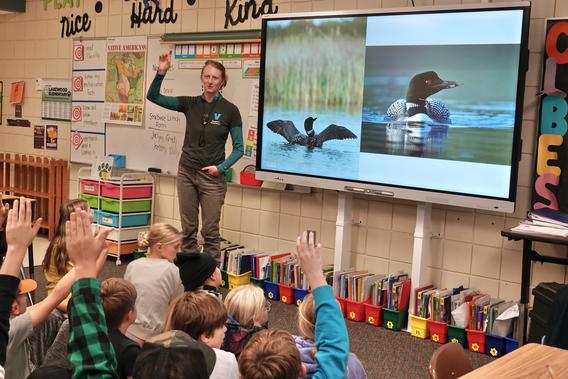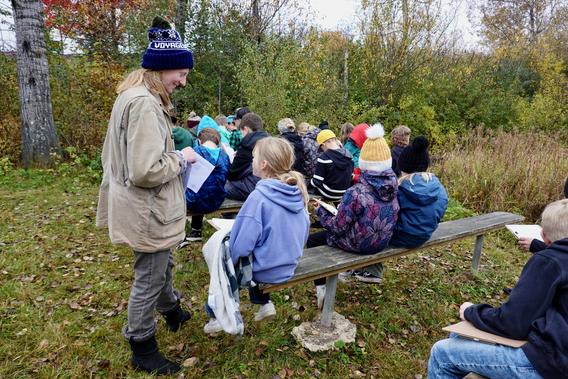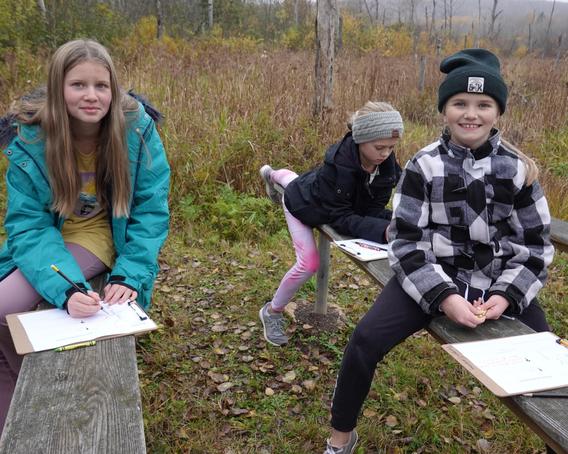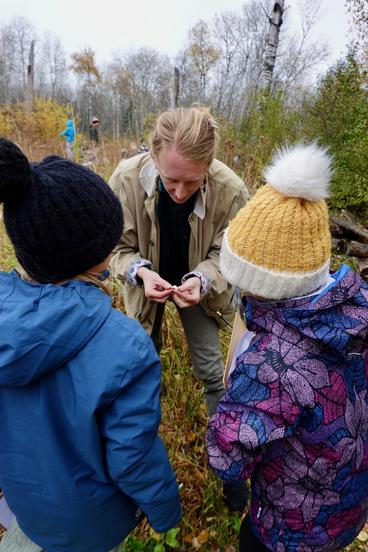
Connecting kids with nature
Graduate student inspires kids in local classrooms with lessons from Voyageurs National Park
Moss Schumacher is passionate about making nature exploration accessible. They brought the pristine beauty of Voyageurs National Park to students in 18 Duluth area elementary schools last fall through a new mobile classroom initiative by the Voyageurs Conservancy.
Though most students won’t experience the park in person, the take-home message is clear: natural wonders exist in one’s own backyard. A student in UMD’s Master of Environmental Education (MEEd) program, Schumacher hopes young people make this connection and become stewards of their environment—a shift that benefits people and the planet.
Schumacher explains, “Connecting to the place you live helps us understand the deep relationship all beings have with one another.”
As an undergraduate, Schumacher attended UMD and forged a unique path to graduation, earning a bachelor’s degree in psychology and a minor in cognitive science. A “Biology and Society” course with Assistant Professor Paul Bates was influential. “I loved it so much. I liked the way he integrated a social perspective into science,” Schumacher says.

Schumacher’s path was circuitous after that. It included work in a neuropsychological research lab, travel around Europe to do work exchanges, a remote job with a medical device company, and an Americorps Conservation Corps position at an outdoor camp.
That last experience helped steer Schumacher toward a 9-month graduate training program at Wolf Ridge Environmental Learning Center. It was “extremely impactful” and led to the MEEd program at UMD and eventually the mobile classroom position. Having that immersive educator training at Wolf Ridge was key. It’s “why I feel comfortable doing what I am now,” Schumacher says.
From psychology to phenology
As part of this role with the Voyageurs mobile classroom, Schumacher develops curriculum and teaches about Minnesota phenology—the seasonal changes that occur with animals and plants. Lessons begin with an interactive lecture and slideshow, which may include stunning scenery from Voyageurs National Park like the northern lights, and photos of wildlife such as moose and loons.

Next, the learning moves outdoors. Intention is key here. It’s not the same as allowing free play outside at recess, according to Schumacher. “It’s intentional and structured, looking at nature a little bit closer.” Students are instructed to explore their surroundings, then they have a chance to reflect on their outdoor exploration and are prompted to write and draw about what they noticed.
At Lakewood Elementary in October, Schumacher’s lecture was well received. A few students struggled to be still and give their undivided attention but there was a noticeable shift in energy when it was time to line up to go outside to explore the school forest.
Lakewood students were enthusiastic and animated as they navigated the trails outside. They eagerly shared their discoveries with each other and their teachers.
“Often the students who aren’t interested in what I’m saying inside, who are quiet or turned off by the lecture, are the ones who get really excited to go outside,” Schumacher says. “That seems really impactful.”
Next year, the part-time position will transition to a full-time job with the Voyageurs Conservancy after Schumacher completes their degree. They are thrilled to continue expanding the program as it brings the "neuropsychological research lab version of myself and the person who loved connecting to land" together into one space. “I didn’t know that could happen!”

Nature’s restorative power
Schumacher is currently working on a related research project for their degree. The project explores the effect of nature-based learning on sustained attention capacity. “Attention is the most valuable resource we have, besides maybe water,” Schumacher explains. “Our attention is in high demand.”
The project will use a cognitive assessment tool to measure students’ attention capacity before and after nature-based activities. Schumacher hypothesizes that it will increase.
Research has shown that exposure to nature can refill or "replenish" the human capacity to pay attention, according to Schumacher. They reference attention restoration theory and studies that indicate even looking out a window to the outdoors or viewing photos of a natural environment can have a positive effect on focus or directed attention. “Something about nature is really restorative to us.”
Schumacher reflects on climate change and the potential impacts it will have. “The world is changing. The land is changing pretty quickly … Being able to build a relationship with the place where one lives I think is enormously helpful. As we move through these countless changes, being able to stay grounded in nature and the place that exists where you are is a way to stay connected as people. I want to give that to kids.”
Funding for the Voyageurs Mobile Classroom is provided by the Minnesota Environment and Natural Resources Trust Fund as recommended by the Legislative-Citizen Commission on Minnesota Resources.
Latest News
- Master’s programs earn top spots in U.S. News & World ReportMaster’s programs earn top spots in U.S. News & World Report U of M Twin Cities and UMD hold first and second rankings in MN for both Best School For Social Work and Best Business School.
- Community-engaged researchCommunity-engaged research Interdisciplinary NIH research engages tribal community, undergraduates
- Right place, right resourcesRight place, right resources From hands-on computer science to natural resources fieldwork, Braden Kowalski found all the right tools at UMD.
- Finance, friendship, and fulfillmentFinance, friendship, and fulfillment LSBE student Marisol Martinez creates a welcoming environment on campus.
- How will warmer winters impact our roads?How will warmer winters impact our roads? From record-setting cold and snow, to record-setting warmth, Minnesota's recent winters have been anything but normal, so we turned to UMD road expert Manik Barman to learn what this latest winter of new extremes means for Minnesotan roads.
- CEHSP staff spotlight: Amy MadsenCEHSP staff spotlight: Amy Madsen Meet Amy Madsen, Title IV-E Child Welfare Program Director since 2017






